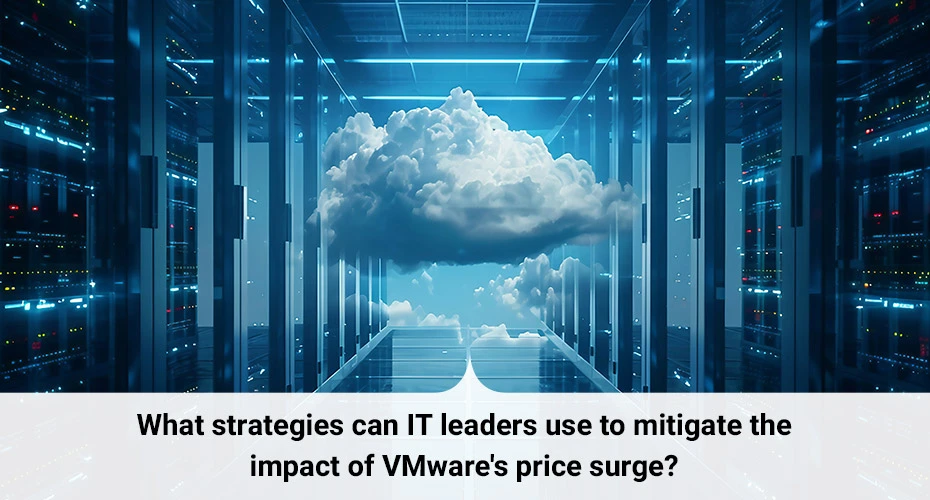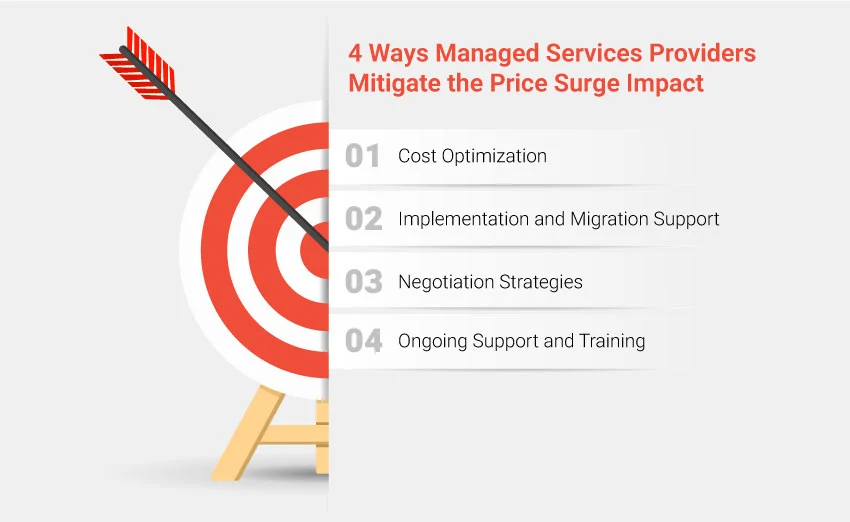October 4, 2024 - by Synoptek
Broadcom’s acquisition of VMware for $61 billion marks a pivotal moment in the technology industry, particularly affecting organizations that rely on VMware’s virtualization and cloud solutions. This strategic move aims to enhance Broadcom’s foothold in enterprise software, leveraging VMware’s expertise in virtualization and cloud computing.

With a shift to a subscription-based model and significant price hikes, organizations are forced to reconsider their IT budgets, potentially accelerating migration to alternative platforms or prompting negotiations for more cost-effective solutions.
As the landscape shifts, adapting to these financial pressures is key for organizations striving to maintain seamless technology operations.
The Impact of Broadcom-VMware acquisition on Your IT Strategy
The Broadcom acquisition of VMware has significantly impacted IT strategies for organizations in terms of pricing and licensing changes and product and service continuity challenges, among others. Here are the key impact areas:
Increased Licensing Costs
The shift to a core-based licensing model and the significant increase in annual support renewal costs have substantially raised the financial burden on organizations. For example, the yearly support renewal cost has jumped from $14,000 to $35,000, marking a 300% increase.
The new subscription model is 63% more expensive than the previous perpetual license model over a 7-year lifecycle. IT leaders must reevaluate their budgets and reallocate funds from other initiatives to cover the increased VMware costs.
Reduced Flexibility
The core-based licensing model, which requires a minimum of 16 cores per socket, reduces flexibility for organizations with varying hardware configurations. For example, a data center with 12 CPU sockets must license 192 cores, even if the actual usage is lower. This inflexibility limits the ability to optimize costs based on actual usage and may lead to over-provisioning of licenses.
Vendor Lock-in Concerns
The exclusive availability of VMware Cloud on AWS through Broadcom raises concerns about vendor lock-in and reduced customer choice. IT leaders may feel compelled to stick with VMware solutions due to the significant investments already made, even if alternative solutions become more attractive.
Uncertainty and Risk
CIOs and CTOs are concerned about the potential impact on their existing infrastructure and cloud strategies, especially given Broadcom’s history of post-acquisition changes that have led to customer dissatisfaction.
How can Managed Service Providers Help with VMware Price Increase?
Managed service providers (MSPs) can play a crucial role in helping businesses navigate the steep price increases associated with VMware’s new subscription model following Broadcom’s acquisition. Here are several ways MSPs can assist:

Cost Analysis and Optimization
- Optimize Licensing: MSPs can thoroughly analyze your current VMware usage to determine if all features are necessary. They can help align workloads with the appropriate VMware product bundles, potentially reducing costs by selecting only the required features rather than paying for comprehensive bundles that include unnecessary services.
- Explore Alternatives: MSPs can introduce businesses to open-source virtualization solutions or alternate cloud service providers. By leveraging their expertise, organizations can help transition to more cost-effective platforms, mitigating the financial impact of VMware’s price hikes.
Implementation and Migration Support
- Migration Planning: Many businesses are considering moving away from VMware due to the increased costs. MSPs can assist in smoothly planning and executing this transition. They can provide a structured approach to migrating workloads to alternative platforms, ensuring minimal disruption to business operations.
- Infrastructure Management: MSPs can offer managed services that reduce the overall complexity of managing virtual environments. This includes providing hypervisor-agnostic disaster recovery and backup solutions, which can help businesses maintain flexibility and control over their infrastructure while potentially lowering costs.
Negotiation Strategies
- Budgeting Assistance: With the new pricing structure, many organizations face unbudgeted increases in operational expenses. MSPs can help businesses reevaluate their IT budgets and provide insights into how to absorb these costs or adjust spending in other areas.
- Negotiation Support: MSPs often have established relationships with vendors and can negotiate on behalf of their clients to secure better pricing or terms. This can be particularly beneficial for smaller businesses that may not have the leverage to negotiate effectively on their own.
Ongoing Support and Training
- Continuous Monitoring: MSPs can provide ongoing monitoring and management of virtual environments, ensuring that businesses are utilizing their resources effectively while identifying potential areas for cost savings.
- Training and Education: MSPs can offer IT staff training on the new VMware licensing model and best practices for managing virtual environments under the new structure. This knowledge can empower teams to make informed decisions about their virtualization
Plan for a Smooth Migration from VMWare to Cloud
Major cloud providers like AWS, Amazon, and Google are offering robust VM hosting services. These services also benefit from scalability, automated backups, and high availability. With the ease of integration with existing systems and the availability of pay-as-you-go models, companies looking to move away from VMware are choosing cloud services tailored to unique needs and environments.
This is how organizations can effectively transition:
1. Conduct a Thorough Audit of Your VMware Portfolio
- Review all purchased and in-use licenses to understand your current VMware environment.
- Identify underutilized licenses and assess if your setup aligns with your organization’s needs.
2. Map Out the Impact of Changes on Your Organization
- Evaluate how the new pricing structure affects your budget and operational capabilities.
- Involve relevant stakeholders, including finance and IT teams, to comprehensively understand the consequences.
3. Begin Planning for a Timed Migration Workflow
- Develop a structured migration plan that outlines key milestones and timelines to avoid rushed transitions.
- Ensure the migration process is smooth and organized, minimizing disruptions to business operations.
By proactively addressing these challenges and implementing strategic mitigation measures, IT leaders can navigate the impact of the Broadcom-VMware acquisition and ensure the continued success of their IT strategies.
Diffuse VMware Volatility with Right Partner
If you want to avoid the anxiety caused by unexpected price hikes and changes in product offerings, you must partner with a competent managed service provider. A competent partner can provide tailored solutions such as public and private cloud hosting, managed on-premises private cloud services, and comprehensive Azure and AWS deployment management.



